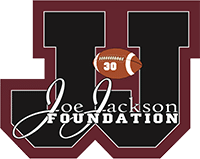Doug Carroll
The Arizona Republic
Feb. 12, 2006 12:00 AM
Custom-made jerseys from members of the Arizona Cardinals and Arizona Rattlers hang in the closet of Joe Jackson’s room at Barrow Neurological Institute in central Phoenix. The walls are covered with the best wishes of friends and strangers alike: former Arizona State University coach Frank Kush, Phoenix Mayor Phil Gordon and the football teams at Corona del Sol, Mesquite and North high schools. Autographed balls were sent by the Denver Broncos and St. Louis Rams, and a framed photo of Jackson in his No. 30 football uniform rests against a wall.
But these are just things to Jackson, a 16-year-old Chandler teenager whose life was forever changed when he broke his neck Nov. 21 while trying to make a tackle during an intrasquad scrimmage at Hamilton High School. The injury left him paralyzed from the waist down, but he’s still here. Maybe that’s how he’s able to radiate a positive outlook through a daily tedium of therapy that might leave others feeling blue. Or why his megawatt smile almost makes his wheelchair disappear. Jackson’s easygoing nature and quiet confidence are magnetic, drawing others to him. In this respect, the accident changed nothing. “I leave that place fully uplifted,” said Ernest Jones of his visits to Jackson at Barrow. Jones, a former National Football League player, is Jackson’s former youth football coach. He lives in Chandler. “He’s an inspiration, and I’m not just saying that because of the situation he’s in. I would have told you the same thing before his injury.” According to the National Center for Catastrophic Sports Injury Research, there were 25 catastrophic injuries during high school football participation in 2003, the most recent year reported. While that was the highest number since 1998, such injuries are still rare. On that November day in Chandler, even the toughest athletes and coaches at Hamilton cried when they heard the news. After considering forfeiting a playoff game against Mesa Westwood, the team dedicated its state championship quest to Jackson. “For coaches, players are like our kids,” said John Wrenn, Hamilton’s head coach, who visits Jackson every Saturday. “It’s like one of our own getting hurt. The last two weeks (of the season) meant very little. This put a different light on things.”
-Battered, not broken-
A C-6 cervical injury such as the one incurred by Jackson usually results in quadriplegia and limited use of the hands. Although Jackson is paralyzed, the prospects of him leading an independent life are relatively good, according to Dr. Sally Alcott, a neuro-rehabilitation physician at Barrow. “He’s a pretty typical C-6 in terms of the strength and sensation he has,” Alcott said. “It’s very important to have a good attitude. Those people do better.” Jackson has that attitude – and no regrets about playing his sport. “People always ask if I hate football because of my injury,” he said. “But the injury won’t make me change my mind. I love football. I was watching it all the time (on TV) right after it happened.” Todd and JoAnn Jackson know what their son is up against. But theirs is a deeply spiritual, Christian household. A favorite family Bible verse is Philippians 4:13: “I can do everything through Him who gives me strength.” “That is the key,” Todd said. “If you don’t have faith, there is no other way. It’s how we draw support. It’s what we believe.” Added encouragement came from a phone conversation with the father of Adam Taliaferro, a Penn State football player who was similarly injured in a game in 2000 and wrote a book about the recovery process, Miracle in the Making. Shortly after Joe’s injury, the Jacksons happened to be reading the book when Andre Taliaferro called. “He said to believe in a miracle,” Todd said. “He said that even though the doctors have good intentions and know a lot from research, it’s not the final say. He said to continue to support and love him and keep positive people around him.” The Jacksons are resolute about moving forward and not looking back. “Once you know how close Joe might have been to not being with us,” Todd said, “there is no opportunity to dwell on (the negative). We’re thankful to have Joe around. The focus is not on what he can’t do. The focus is on what he can and will do.” Joe undergoes three hours a day of physical and occupational therapy, five days a week. “I’ve never heard him say, ‘I can’t do that,’ ” physical therapist Brianna Murphy said. “What he can do for himself is amazing. He doesn’t like people to do things for him.” In the morning, Jackson practices rolling over on his side and sitting on the edge of the bed. He is learning to transfer himself from bed to wheelchair with the use of a slide board. He does a variety of leg stretches. In the afternoon, he lifts weights for his shoulders and works on the fine motor skills involved in clutching small items. “It’s physical, but it’s easy,” he said. “I’m used to it. Football is what’s hard.”
-School comes to him-
Because he cannot return to school yet, a team of five Hamilton teachers has brought school to him. For two hours, usually in the late afternoon, he gets a week’s worth of instruction in one of five subjects: English, math, chemistry, history or marketing. “My ‘classroom’ is located in the lounge by the Starbucks, where Joe and I can find some sun,” said Jessica Hogan, an English teacher who is part of the teaching team. “Instead of having 35 students, I have one. Joe is writing now, and he jokes with me about his legibility. “Joe has an amazing spirit. It’s rare. He will accomplish anything that he wishes.” Jackson’s goal is to return to campus for the school year’s fourth quarter. With the tutoring, he is on track to graduate with his class in spring 2007. History teacher Les Renner knows his student wants no sympathy, and Renner isn’t cutting him any slack. “I told him, ‘Joe, there are no free rides, you gotta earn it,’ ” Renner said.
-Friends at his side-
Just as the teachers have come to him, so have his friends. Few restrictions have been placed by the Jacksons on comings and goings, with no need to check teenage humor at the door. Classmates Louis Prisco, Michael Martinez, Chase Barth and Dan Carroll didn’t miss a day during winter break. They had wheelchair races when the Barrow staff wasn’t looking and intense video-game battles on the Xbox 360 in Jackson’s room. But the mood turns serious when the boys think back to the week of the injury. “When you see your coaches breaking down in front of you,” Barth said, “it hits you hard. After every practice, we’d pray for him. Joe and I were partners in most of the drills. Without him, something was missing.” Martinez finds it difficult to leave his friend at the end of a visit. “He has to see our backs walking out of there, and he can’t walk out with us,” he said. Jones, the former NFL player, said he has seen professional athletes without such inner strength. “That’s one kid who will never feel sorry for himself,” he said. “I’ve mentored a lot of young people, and his character is unbelievable. He is a joy to be around. “God has a purpose for him.”

